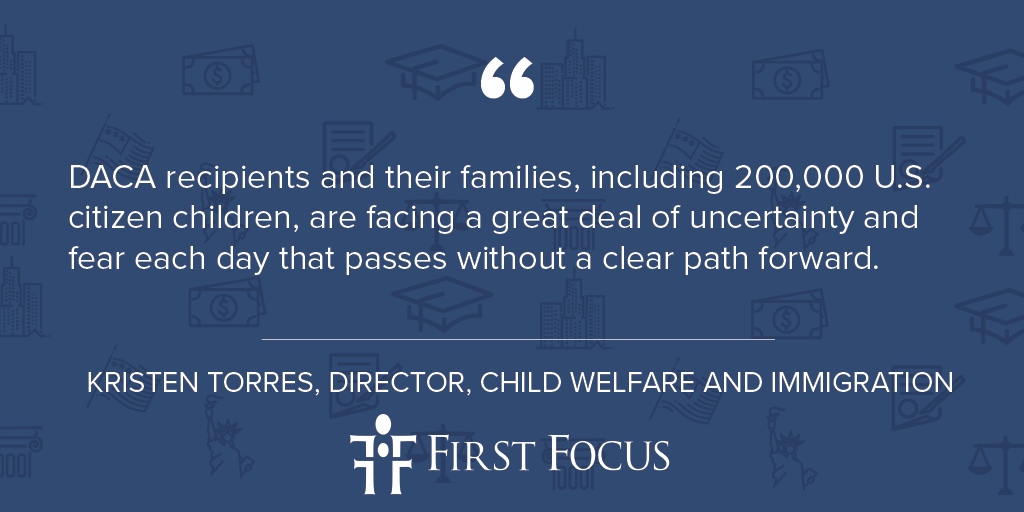
Because Congress has neglected to act, the future for more than 800,000 recipients of Deferred Action for Childhood Arrivals (DACA) program still remains uncertain. In 2016, the Trump administration eliminated the DACA program which provided protections for undocumented immigrants who came to the United States as children. DACA recipients are young people who have proven their dedication to this nation and have shown incredible resilience in their ability to pursue their dreams of becoming productive citizens of the United States. In addition, they have continued to further their education, strengthen their job skills, and volunteer to protect their communities all without the certainty of what their future may hold.
DACA recipients and their families, including 200,000 U.S. citizen children, are facing a great deal of uncertainty and fear each day that passes without a clear path forward. Congress has a responsibility to ensure the safety and well-being of the children who were brought to this country at no fault of their own and have grown up only knowing the United States as their home.
Three Courts have challenged the administration’s decision to end the DACA Program. In November the Department of Justice (DOJ) petitioned the Supreme Court to bypass three Federal Courts of Appeals in New York, Washington, D.C., and California. The Department of Justice (DOJ) is attempting to expedite this case to the Supreme Court, where their ultimate goal is to end the DACA program. Learn more about the ongoing litigation here from the National Immigration Law Center (NILC).
Similarly, Temporary Protected Status (TPS) is a temporary immigrant status granted by the Secretary of the Department of Homeland Security to individuals from designated foreign countries due to crisis situations such as ongoing civil war, natural disasters or national epidemics. The program was created by Congress in 1990 as a form of humanitarian relief.
The Trump administration has ended TPS for 6 out of 10 designated countries since 2017: Haiti, Sudan, Nicaragua, El Salvador, Nepal, and Honduras. There are approximately 325,000 TPS beneficiaries currently living in the United States. Because the conditions that warranted this TPS designation have continued to persist in countries such as El Salvador, which has the highest number of TPS recipients, many beneficiaries have resided legally in the United States for more than two decades. They have established lives, have U.S. born children, have mortgages, participate in the workforce, and contribute to the national economy. According to one report more than one third of TPS recipients are homeowners and will contribute $164 billion dollars to the United States GDP over the next decade. View our TPS Fact Sheet here.
Collectively, TPS beneficiaries from El Salvador, Honduras, and Haiti alone have over 273,200 US-born children. Without a protected immigration status, these families will be forced to make desperate decisions. Jose Urias, TPS recipient and spokesperson for the National TPS Alliance recently stated at a congressional briefing, “We are the next wave of family separations.”
Parents must contemplate returning to a region with their children at a time when there is a mass exodus of children and young people fleeing gang violence and extreme poverty. Other families may choose to stay in the U.S. and risk working without legal authorization. This means that after decades of providing for their families they will be forced to look over their shoulders and fear separation from their loved ones on a daily basis. Congress must recognize that terminating these protections will be devastating for hundreds of thousands of families and children.
In October US District Judge Edward Chen granted a preliminary injunction stopping the government from terminating TPS for immigrants from Sudan, El Salvador, Haiti and Nicaragua.
The lawsuit filed in California on behalf of the US citizen children of TPS holders says that the government’s cancellation of protected status for long-term residents from Haiti and El Salvador “violates the constitutional rights of school-age United States citizen children of TPS holders, by presenting them with an impossible choice: they must either leave their country or live without their parents.”
Learn more about ongoing TPS litigation here from the Catholic Legal Immigration Network Inc. (CLINIC).
Congressional Action Needed:
On DACA:
The Dream Act introduced by Sens. Durbin (D-IL) and Graham (R-SC) provides conditional legal status and a path to citizenship for certain long-term residents who entered the U.S. as children (known as Dreamers). Rep. Roybal-Allard has introduced the Dream Act in the House
View our DREAM Act Fact sheet here.
On TPS
In the Senate, Senators Ben Cardin (D-MD.), Chris Van Hollen (D-MD.) and Diane Feinstein (D-Calif.) sponsored the SECURE Act to protect TPS recipients. “Our bill would provide a path to citizenship for those who have been living, working and raising U.S. citizen children in the United States for two decades. These individuals have established deep roots in their communities. It would be cruel and inhumane to separate these families.”
In the House Rep. Nydia Velazquez introduced H.R. 4253 the American Promise Act that would allow recipients of TPS to adjust to lawful permanent resident status. Similarly, Rep. Yvette Clark introduced H.R. 4384, the ASPIRE TPS Act.
